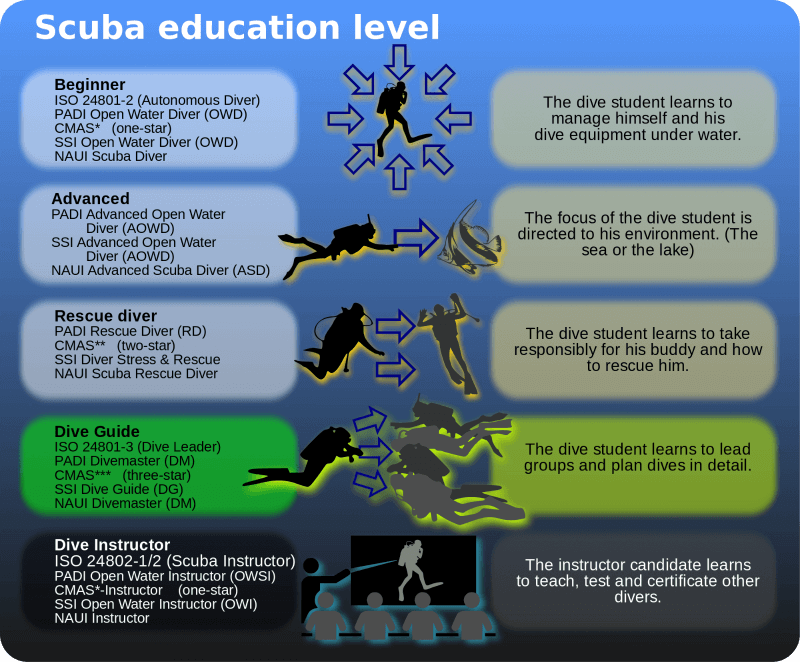The allure of the underwater world is undeniable, beckoning adventurers to explore vibrant coral reefs and encounter fascinating marine life. But before you plunge into the depths, a crucial question arises: does scuba diving require certification? The answer, unequivocally, is yes. Scuba diving certification is not merely a suggestion; it’s a fundamental requirement for safe and responsible underwater exploration, ensuring both your well-being and the preservation of the delicate marine ecosystem.
Why Scuba Diving Certification is Essential
Scuba diving isn’t as simple as strapping on a tank and jumping in. It involves understanding complex physics, mastering specialized equipment, and learning how to react to potential emergencies. Certification courses provide the necessary knowledge and skills to navigate these challenges safely.
- Safety First: Certification programs teach essential safety procedures, including buoyancy control, emergency ascents, and equipment troubleshooting.
- Equipment Proficiency: Divers learn how to properly assemble, use, and maintain their scuba gear.
- Environmental Awareness: Courses emphasize responsible diving practices to minimize impact on marine environments.
- Access to Dive Sites: Many dive operators and locations require proof of certification before allowing divers to participate.
Understanding Different Certification Levels
Scuba diving certifications are structured in levels, allowing divers to progress as their skills and experience grow.
- Open Water Diver: This is the entry-level certification, allowing divers to dive to a maximum depth of 18 meters (60 feet) with a buddy.
- Advanced Open Water Diver: This certification builds upon the Open Water skills, introducing divers to deeper dives, navigation, and other specialized activities.
- Rescue Diver: This course focuses on preventing and managing diving emergencies, equipping divers with the skills to assist themselves and others.
- Divemaster: The first professional level, Divemasters can guide certified divers and assist instructors.
- Instructor: Instructors are qualified to teach scuba diving courses and certify new divers.
Choosing a Certification Agency
Several reputable organizations offer scuba diving certifications, each with its own standards and curriculum. Some of the most recognized agencies include:
- PADI (Professional Association of Diving Instructors)
- SSI (Scuba Schools International)
- NAUI (National Association of Underwater Instructors)
- BSAC (British Sub-Aqua Club)
The best agency for you will depend on your personal preferences and the availability of courses in your area. Research different agencies and choose one that aligns with your goals.
FAQ: Scuba Diving Certification
How long does it take to get certified?
The Open Water Diver course typically takes 3-4 days to complete.
How much does scuba diving certification cost?
The cost varies depending on the agency, location, and course options, but generally ranges from $300 to $600.
What are the prerequisites for scuba diving certification?
Most agencies require participants to be at least 10 years old and in good physical health. A basic swimming ability is also necessary;
Can I get certified online?
While some theoretical components can be completed online, in-water training is essential for certification.
The Importance of Continuing Education
Even after obtaining your initial certification, continuing education is crucial for expanding your skills and exploring new diving opportunities. Advanced courses, specialty certifications, and regular refresher dives can help you become a more confident and competent diver. Remember, the ocean is a dynamic environment, and continuous learning is key to safe and enjoyable underwater adventures.
Ultimately, understanding that does scuba diving require certification is the first step towards a lifetime of incredible underwater experiences. Embrace the learning process, respect the marine environment, and dive safely!
Beyond Certification: Responsible Diving Practices
Gaining your scuba diving certification is a significant achievement, but it’s just the beginning of your journey as a responsible diver. Beyond the technical skills and knowledge acquired during your course, adopting ethical and sustainable diving practices is paramount for preserving the beauty and health of our oceans. This involves minimizing your impact on the marine environment and actively contributing to its conservation.
Tips for Responsible Diving
- Maintain Neutral Buoyancy: Proper buoyancy control prevents accidental contact with coral reefs and other delicate marine life. Practice your buoyancy skills regularly to avoid damaging the underwater ecosystem.
- Avoid Touching or Collecting: Resist the urge to touch, handle, or collect any marine organisms or artifacts. Even seemingly harmless contact can disrupt the delicate balance of the ecosystem.
- Be Aware of Your Fins: Keep your fins away from coral and other fragile structures. Fin kicks can easily damage or break coral, causing long-term harm.
- Properly Dispose of Trash: Never leave any trash behind, and if you see any debris, collect it and dispose of it properly on land.
- Choose Eco-Friendly Dive Operators: Support dive operators who prioritize environmental sustainability and conservation efforts.
- Report Any Damage or Illegal Activities: If you witness any damage to the marine environment or illegal activities, report it to the appropriate authorities.
The Future of Scuba Diving
The future of scuba diving depends on our collective commitment to responsible practices and conservation efforts. As divers, we have a unique opportunity to witness the beauty and fragility of the underwater world firsthand. By embracing sustainable diving practices and advocating for marine conservation, we can help ensure that future generations can enjoy the wonders of the ocean. Technological advancements are also playing a role, with innovations in dive equipment and underwater monitoring systems contributing to safer and more environmentally friendly diving experiences.
As you embark on your scuba diving adventures, remember that you are an ambassador for the underwater world. Your actions can have a significant impact on the health and well-being of our oceans. So, dive responsibly, explore with respect, and help protect the marine environment for generations to come. The question of whether does scuba diving require certification is answered with a resounding yes, but the question of whether you will be a responsible diver is answered by your actions.

